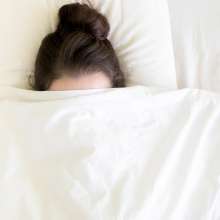Many people develop sleep problems when they are stressed out, or after having witnessed or experienced a traumatic event such as a car accident.
Sleep disturbances including difficulty falling asleep, waking frequently, and having nightmares are common. They can be normal responses to the stress of a past trauma, or an anticipated or perceived threat.
Sleep problems commonly associated with stress
Causes for difficulty falling asleep
- Conscious or subconscious perception of the need to stay alert
- Medical conditions commonly associated with trauma such as chronic pain, stomach and intestinal upset.
- Thinking, worries, and unwanted memories
- Use of drugs or alcohol
Causes for difficulty staying asleep
- Distressing dreams or night terrors
- Hyper-arousal, active movements of the arms or legs during sleep, and dreams may cause awakening or restless sleep
- Anxiety and panic attacks symptoms may interrupt sleep. They include racing heartbeat, dizziness, difficulty breathing, sweating, fear, disorientation, and the feeling of losing control
- Frequent awakening to check for security
Sleep problem may be short term, but it may also develop into long term problem. It is best to consult your physician. Try to pay more attention to sleep hygiene in order to get back to normal sleep pattern as soon as possible.
Sleep smart tips:
To promote deep, continuous and refreshing sleep
- Get the right amount of sleep
- Maintain a regular schedule
- Sleep at night, do not nap during the day
- Avoid alcohol in the evening
- Avoid caffeine after lunch
- Avoid nicotine in the evening
- Exercise but not after dinner time
- Ensure that sleep environment is comfortable
- Establish a bedtime ritual
Data from: Dement WC. The Promise of Sleep. Random House (NY), 2000.
Some medications that may cause sleep problems are:
| Anti-depressants | Beta-blockers | Nasal Decongestants | Pain Relievers | Asthma Drugs | Diuretics | Diet Pills |
|---|---|---|---|---|---|---|
|
|
|
|
|
|
|
Beta-blockers
Beta-blockers are common drugs used to treat several problems. They block the effect of certain hormones that cause the heart to beat faster. For patients with heart failure, they prevent these hormones from overworking the heart, allowing the heart to pump better, and lowering blood pressure.
They are prescribed for treating hypertension, angina, rapid heartbeats, preventing migraine headaches, and have been used to treat anxiety and anxiety disorders such as stage fright and panic attack.
Original article from WellnessOptions #12, 2003





